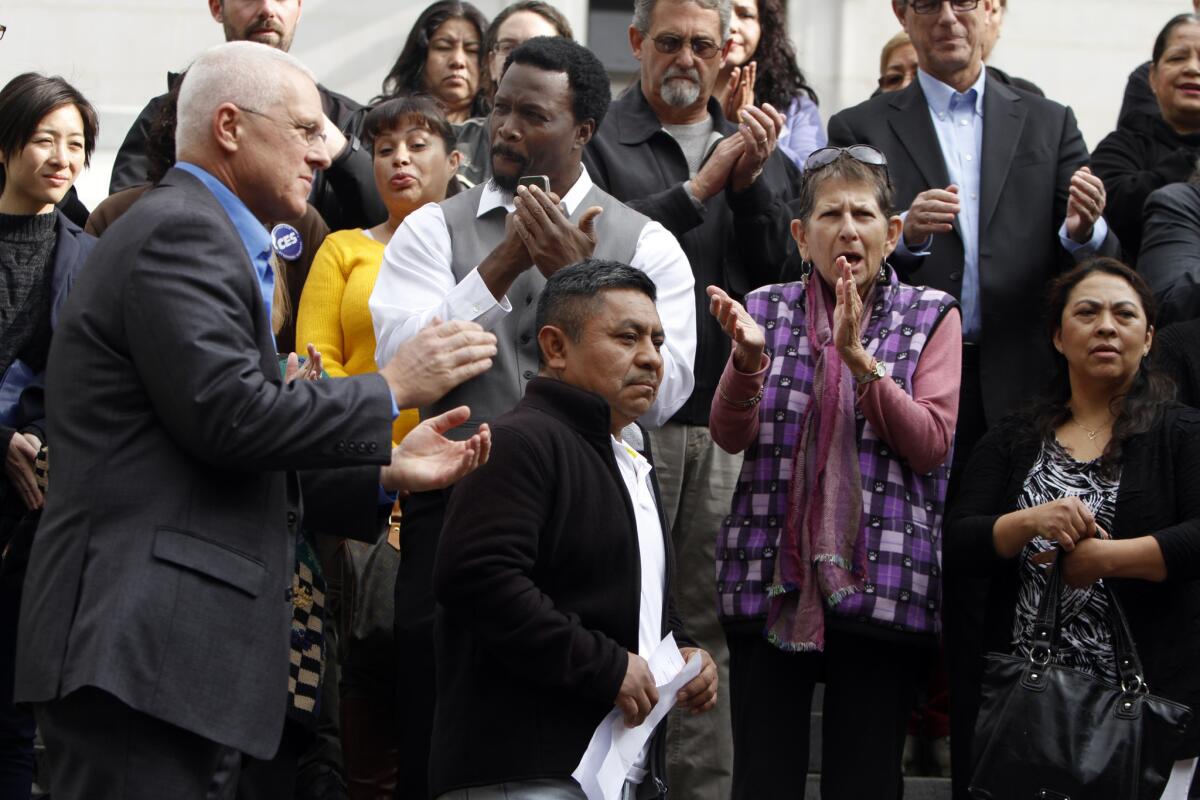Hotel industry warns of job losses if L.A. minimum wage is hiked

- Share via
The hotel industry fired a new salvo Thursday in the debate over raising the minimum wage for workers at Los Angeles’ big hotels, citing a new study that warns a wage increase could lead to job cuts.
Los Angeles officials are considering raising the minimum wage to $15.37 an hour for workers in large hotels – a significant increase over the current California state minimum of $8 an hour. That rate will increase to $10 an hour by 2016.
Backers of the city proposal, including labor unions and some civic and business leaders, say that higher wages will pull hotel workers out of poverty and pump up the local economy with employees’ spending.
The new report, prepared for the California Hotel & Lodging Assn. and written by PKF Consulting USA, argues that the wage increase could spur hotels to lay off workers. PKF, a consulting firm that serves the hospitality industry, also wrote that it had “significant doubts about the economic benefit” of a higher minimum wage.
The report included feedback from Los Angeles hotel managers about changes they expect to make if the proposed wage increase is approved by the City Council. It also discussed the effects of previous minimum wage increases in the Los Angeles area and beyond.
The consultants cited a recent Penn State University study, commissioned by the American Hotel & Lodging Assn., that estimated the Los Angeles economy could lose $255 million annually as a result of the increased minimum wage.
The California hotel association argued that it was unfair to single out their industry for the wage increase.
“We think it’s perplexing that hotels — and non-union hotels — are the only targets here,” said Lynn Mohrfeld, the group’s president and CEO. He argued that unions “are hoping that more hotels will unionize to increase their membership and avoid the provision.”
The proposed wage increase may exclude some unionized hotels. An earlier Los Angeles ordinance that set a minimum wage for workers at hotels near LAX included a provision allowing unionized hotels to waive the wage requirements, if the waiver was explicitly spelled out in a collective bargaining agreement. Similar rules are expected to be part of the new ordinance being drafted by the city attorney’s office.
Mohrfeld said the minimum wage requirement shouldn’t apply to hotel employees who receive tips that put their earnings over the proposed minimum. City officials have warned that setting up different wage requirements for employees who get tips could be legally problematic.
The report is the latest in a series of dueling reviews of the effects of the wage proposal. An earlier study by the Economic Roundtable, underwritten by the Los Angeles Alliance for a New Economy, found that increasing the minimum wage for hotel workers would stimulate the economy and produce jobs through tens of millions of dollars in increased consumer spending.
Economic Roundtable President Daniel Flaming argued that the earlier minimum wage imposed on LAX-area hotels had not hurt them, contrary to the negative effects asserted in the PKF report. “This assertion is not supported by actual hotel occupancy data,” which he said showed high occupancy rates for those hotels.
“The example ... actually supports the conclusion that hotels can flourish while paying a living wage to their workers,” Flaming said.
Another recent report, commissioned by the city from Blue Sky Consulting Group, concluded that the wage increase was “an inherent tradeoff” and its ultimate effect on economic activity could not be readily calculated. Though some workers would benefit, others would probably lose jobs, the Blue Sky consultants wrote.
Councilman Curren Price, who has backed a wage increase for hotel workers, said he and his staff hadn’t had a chance to fully review the PKF report or discuss its findings with the hotel association.
Thus far, the studies “all seem to have varying recommendations,” Price said in an emailed statement. “This is why we are still deliberating this ordinance and considering all input from stakeholders.”
The City Council could vote on the minimum wage requirement later this year. If adopted, the change would take effect in July 2015 for hotels with at least 300 rooms, and would become effective for hotels with at least 125 rooms the following year.
Follow @latimesemily for what’s happening at Los Angeles City Hall
More to Read
Sign up for Essential California
The most important California stories and recommendations in your inbox every morning.
You may occasionally receive promotional content from the Los Angeles Times.











